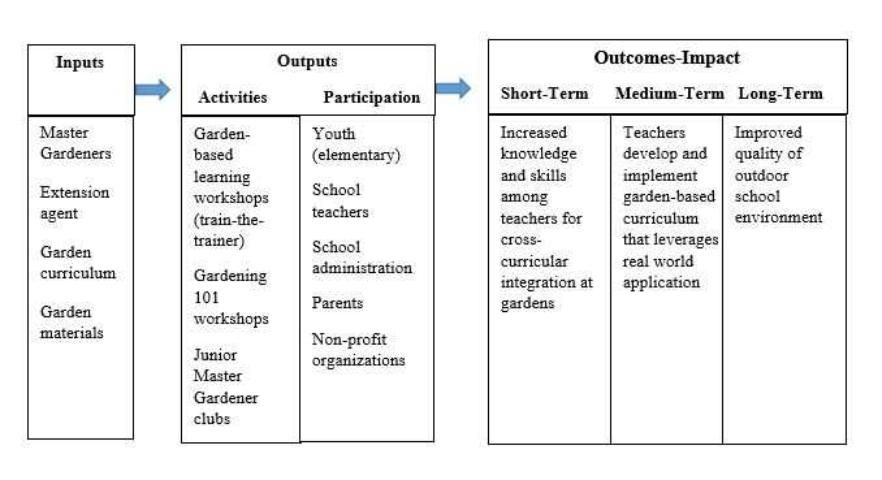National trends indicate that school gardens are positioned to become fixtures in primary and secondary education. Garden-based learning and curricula are aligned with school standards and reinforce educational activities in diverse subjects, including science, language arts, math, and social studies. Extension faculty and staff are often called upon by clientele to provide technical expertise on these efforts within schools. An estimated 1 in 5 Extension agents are involved in school gardens (Benson, 2014). Extension professionals and their volunteers support school garden initiatives in various ways, including providing horticulture, nutrition, and food safety expertise and instruction (Black, Haynes, Schrock, Duerfeldt, & Litchfield, 2016; Dzubak, Shaw, Strohbehn, & Naeve, 2016). However, there is a clear lack of an outcome-driven framework to support organizations, including Extension, to use to determine and evaluate the short-, medium-, and long-term outcomes for program activities. This paper outlines key outcomes identified through expert consensus that can be used by Extension professionals to develop a logic model for the school garden program.
The Delphi Process
To create a set of agreed-upon program indicators, the Delphi technique was used by the authors to gather the experiences of an expert panel of Florida school garden stakeholders (N=74), including participants from state agencies, non-profits, institutions of higher learning, and various school systems across the state. The Delphi technique is an iterative research process that elicits consensus among a group of stakeholders (Warner, 2015). Participants responded to three waves of a survey. In Round 1, participants listed all the outcomes that come from a successful school garden program, including short (changes in knowledge, attitudes, skills, and aspirations), medium (behavioral change/adoption of practices), and long-term (social, economic, and environmental) outcomes. The authors assessed the results from round one line-by-line and recoded them into well-defined categories. These were then organized into short-term, medium-term, and long-term outcomes. In Round 2, participants rated their agreement using a Likert-scale on how meaningful they felt each outcome is in the evaluation of a successful school garden program. Two-thirds of participants had to strongly agree or agree that the item was meaningful in order for consensus to be reached. Only the items that two-thirds agreed upon were included in Round 3. The same process was used for Round 3. Participants reached consensus on 18 short-, 13 medium-, and 11 long-term outcomes in Round 3.
Findings and Implementation
Participants' identification of short-term, medium-term, and long-term outcomes can be used by Extension faculty and staff in program planning and evaluation to develop logic models and measurable objectives (Israel, 2001). You must consider if your program is more focused on the professional development of teachers or youth education when developing your logic model. Figure 1 below illustrates short-term, medium-term, and long-term outcomes appropriate for an agent who offers a workshop on garden-based learning to teachers. Extension agents can select outcomes from the Delphi study results based on local needs that they can adapt into measurable objectives for reporting. Outlining these aspects of their program first, Extension agents can select curricula that align with the intended outcomes of their program and create evaluation tools that can measure the attainment of each outcome. In this example, the short-term outcome "increased knowledge and skills among teachers for cross-curricular integration at gardens" and the medium-term outcome "teachers develop and implement garden-based curriculum that leverages real world application" assess and report knowledge and behavior change. The same process would be evoked for a youth education program, taking the appropriate outcomes and organizing them within the logic model structure. Further, these Delphi study results can be used by school garden professionals to create a logic model for a program with several activities that are all intended to achieve the same objectives. See Figure 2 for an example of a basic logic model for a major program.


Summary
As interest and implementation of school gardens grows across the nation, there is a need to demonstrate the outcomes of these efforts by the organizations that support school gardens. In Extension, faculty and staff contribute significant time and resources to work with teachers, school staff and administration, and volunteers to see these efforts succeed. A robust set of tools is needed to document the outcomes from such activities. The Delphi technique provided a methodology to bring a group of experts together to achieve consensus on the outcomes most meaningful to school garden programming. The results of this Delphi study indicate there is a wide breadth of outcomes that Extension faculty and staff can utilize to plan, implement, and evaluate programs. The study results are the first step in developing a comprehensive set of intended outcomes that can be used to create measurable objectives and evaluation tools.
References
Benson, M. C. (2014). Exploring extension involvement in farm to school program activities. Journal of Extension, 52(4), 4FEA4.
Black, B. J., Haynes, C., Schrock, D., Duerfeldt, K., & Litchfield, R. (2016). Master Gardener–led lessons increase knowledge in gardening and environmental science for Iowa summer camp youth. Journal of Extension, 54(5), 5RIB9.
Dzubak, J., Shaw, A., Strohbehn, C., & Naeve, L. (2016). Food safety education for students and workers in school gardens and university farms. Journal of Extension, 54(1), 1TOT7.
Israel, G. D. (2001). Using logic models for program development. AEC360. Gainesville: University of Florida Institute of Food and Agricultural Sciences. https://edis.ifas.ufl.edu/wc041
Warner, L. A. (2015). Using the Delphi technique to achieve consensus: A tool for guiding extension programs. AEC521. Gainesville: University of Florida Institute of Food and Agricultural Sciences. https://edis.ifas.ufl.edu/wc183